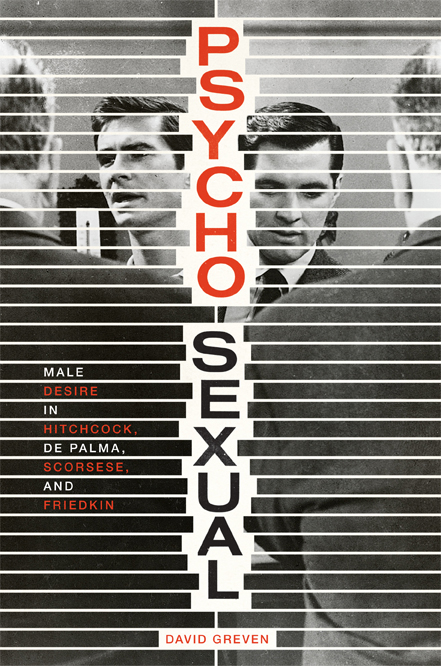LOOKS AT INFLUENCE OF HITCHCOCK ON DE PALMA, SCORSESE, FRIEDKIN
 Our old friend David Greven has a new book, Psycho-Sexual, now available. Greven tells us that the book "is about Hitchcock and masculinity, and the influence of Htichcock on New Hollywood directors like De Palma, Scorsese, and Friedkin. I have two chapters on De Palma, whom I call the greatest of the New Hollywood directors in the book. The first is a revised, expanded version of the essay I wrote on the early Vietnam War-era comedies. The other is a new piece, a reassessment of Dressed To Kill. My effort in this book is to pay close attention to what critics often ignore, even supportive De Palma critics: the aesthetic and ideological aspects of De Palma's reworking of Hitchcock."
Our old friend David Greven has a new book, Psycho-Sexual, now available. Greven tells us that the book "is about Hitchcock and masculinity, and the influence of Htichcock on New Hollywood directors like De Palma, Scorsese, and Friedkin. I have two chapters on De Palma, whom I call the greatest of the New Hollywood directors in the book. The first is a revised, expanded version of the essay I wrote on the early Vietnam War-era comedies. The other is a new piece, a reassessment of Dressed To Kill. My effort in this book is to pay close attention to what critics often ignore, even supportive De Palma critics: the aesthetic and ideological aspects of De Palma's reworking of Hitchcock."We look forward to reading the book. Below is the official description from the University of Texas Press website:
"Bridging landmark territory in film studies, Psycho-Sexual is the first book to apply Alfred Hitchcock’s legacy to three key directors of 1970s Hollywood—Brian De Palma, Martin Scorsese, and William Friedkin—whose work suggests the pornographic male gaze that emerged in Hitchcock’s depiction of the voyeuristic, homoerotically inclined American man. Combining queer theory with a psychoanalytic perspective, David Greven begins with a reconsideration of Psycho and the 1956 remake of The Man Who Knew Too Much to introduce the filmmaker’s evolutionary development of American masculinity.
"Psycho-Sexual probes De Palma’s early Vietnam War draft-dodger comedies as well as his film Dressed to Kill, along with Scorsese’s Taxi Driver and Friedkin’s Cruising as reactions to and inventive elaborations upon Hitchcock’s gendered themes and aesthetic approaches. Greven demonstrates how the significant political achievement of these films arises from a deeply disturbing, violent, even sorrowful psychological and social context. Engaging with contemporary theories of pornography while establishing pornography’s emergence during the classical Hollywood era, Greven argues that New Hollywood filmmakers seized upon Hitchcock’s radical decentering of heterosexual male dominance. The resulting images of heterosexual male ambivalence allowed for an investment in same-sex desire; an aura of homophobia became informed by a fascination with the homoerotic. Psycho-Sexual also explores the broader gender crisis and disorganization that permeated the Cold War and New Hollywood eras, reimagining the defining premises of Hitchcock criticism."
Updated: Saturday, January 5, 2013 4:27 PM CST
Post Comment | Permalink | Share This Post



